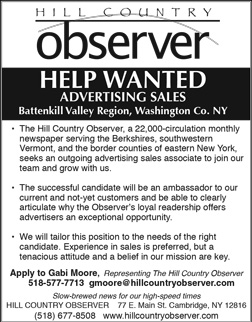Editorial August 2015
E D I T O R I A L
Stefanik on food labels: Keep public in the dark
It began with a triumph of representative democracy. Last year, legislators in Montpelier voted overwhelmingly to make Vermont the first state in the nation to require labeling of foods containing genetically engineered ingredients.
Over the past several years, Vermonters had made it clear that they wanted the right to know what was in their food, and they spoke out loudly – and jammed legislative hearings – in support of the labeling measure. Gov. Peter Shumlin signed it into law last May.
As predicted, the food industry promptly went to court to try to overturn the law, claiming the free-speech rights of processed-food manufacturers are being unfairly harmed by the Vermont’s new labeling requirements. That case is still pending, but the industry lost a key ruling in April when a federal judge refused to block the state from moving toward full implementation of the law in July 2016.
So, fearing it might lose in court, the industry tried for an end run around Vermont. It went to Washington, a place where free-speech rights are more reliably allocated in proportion to the depth of one’s pockets.
And last month, the industry scored a major success when the U.S. House voted 275-150 for a bill that would prohibit individual states from requiring labeling of genetically modified foods. The bill’s sponsors gave it an Orwellian title: the Safe and Accurate Food Labeling Act. Opponents dubbed it the “Deny Americans’ Right to Know” (Dark) Act.
Republicans, who normally claim the federal government should keep its nose out of states’ business, voted for the bill in droves.
But the House vote didn’t break strictly along party lines. Locally, U.S. Rep. Chris Gibson, a Republican whose district includes Columbia and Rensselaer counties, opposed the Dark Act, as did Reps. Richard Neal, D-Mass., Peter Welch, D-Vt., and Paul Tonko, a Democrat who represents much of Saratoga County.
Among the region’s House delegation, only Rep. Elise Stefanik, the freshman Republican whose northern New York district stretches from Washington County to the Canadian border, voted to keep consumers in the dark about genetically modified foods.
What happens in the U.S. Senate could matter to more than just Vermonters. If Vermont’s labeling law is upheld in court and isn’t blocked by Congress, there are a number of other states that might follow its lead.
Opponents of labeling – mainly biotech companies, farmers who grow genetically engineered crops, and the processed food companies that use these crops – continue to argue that transgenic crops are just as safe as conventional ones. Labeling, they say, will unfairly penalize them by creating the impression that there’s something “wrong” with their products.
So far it’s true that no one has proven any direct risk to human health from genetically engineered crops. But the fact that consumers don’t keel over after eating bioengineered corn, for example, doesn’t prove that it’s just as safe or as good as traditional corn.
What’s clear from the campaign that led to Vermont’s labeling law is that, fairly or not, lots of people already think there’s something wrong with genetically modified crops. These consumers just want a bit more information on which to base their purchasing decisions. Our Congress shouldn’t keep them in the dark.

